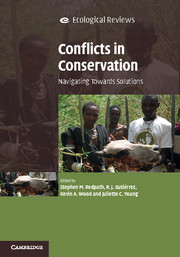Book contents
- Frontmatter
- Dedication
- Contents
- List of contributors
- Foreword by Georgina Mace
- Acknowledgements
- Part I Introduction to conservation and conflict
- PART II Contrasting disciplinary approaches to the study of conflict in conservation
- 3 The value of ecological information in conservation conflict
- 4 Environmental history and conservation conflicts
- 5 The political ecology of conservation conflicts
- 6 Understanding conservation conflicts: an economic perspective
- 7 Anthropological approaches to conservation conflicts
- 8 Law and conservation conflicts
- 9 The relevance of psychology to conservation conflicts
- 10 Conservation conflicts: ethical issues
- 11 A view from sociology: environmental movement mobilisation over old-growth temperate rainforests in British Columbia
- 12 Peace research and conservation conflicts
- 13 Linking conflict and global biodiversity conservation policies
- Part III Approaches to managing conflicts
- Index
- Plate Section
- References
11 - A view from sociology: environmental movement mobilisation over old-growth temperate rainforests in British Columbia
from PART II - Contrasting disciplinary approaches to the study of conflict in conservation
Published online by Cambridge University Press: 05 May 2015
- Frontmatter
- Dedication
- Contents
- List of contributors
- Foreword by Georgina Mace
- Acknowledgements
- Part I Introduction to conservation and conflict
- PART II Contrasting disciplinary approaches to the study of conflict in conservation
- 3 The value of ecological information in conservation conflict
- 4 Environmental history and conservation conflicts
- 5 The political ecology of conservation conflicts
- 6 Understanding conservation conflicts: an economic perspective
- 7 Anthropological approaches to conservation conflicts
- 8 Law and conservation conflicts
- 9 The relevance of psychology to conservation conflicts
- 10 Conservation conflicts: ethical issues
- 11 A view from sociology: environmental movement mobilisation over old-growth temperate rainforests in British Columbia
- 12 Peace research and conservation conflicts
- 13 Linking conflict and global biodiversity conservation policies
- Part III Approaches to managing conflicts
- Index
- Plate Section
- References
Summary
Like many of the social sciences, sociology is a multi-paradigm science (Ritzer, 1975). Different approaches explain social phenomena at different scales (from the individual to the world system) and focus on different aspects of social reality (e.g. the distinction between the objective world and the subjective world). Another distinction is between descriptive and normative analysis. Descriptive analyses focus on explanation and understanding cause and effect relationships. Normative analyses focus on moral dimensions of issues and what we ‘ought to do’. While sociological approaches often entail elements of both of these approaches, most work tends to emphasise one or the other. Also, there is a distinction between sociological work that has further theoretical explanation as a primary goal and work that is more applied – that is, work that applies past theory and research to practical empirical problems.
In sociology, there are a variety of views about conflict, and the orientation of any given analysis depends upon the theoretical framework and objectives of the researcher. Thus, the approach that a sociologist might take regarding conflict depends on where her work is situated with regard to these different considerations. Some sociologists might focus primarily on explaining social conflict, such as someone studying the causes of a revolution, while others might focus on trying to resolve it, such as those supporting a land management planning process. In some instances sociologists might actually be interested in facilitating conflict, such as those who work to mobilise collective action among members of an oppressed group. Some sociologists might focus on the mechanisms that generate conflict (descriptive analysis) – such as the factors that might underlie a conflict over clear-cut logging, while others might focus primarily on the moral dimensions of conflict (e.g. how can gender inequality be reduced in forest-dependent communities). Some sociologists might focus primarily on ‘objective’ indicators of conflict (e.g. the size of a social protest, and its political outcomes), while others might focus on subjective dimensions, such as how conflict is socially constructed (e.g. such as perceptions about the social values that underlie the conflict).
- Type
- Chapter
- Information
- Conflicts in ConservationNavigating Towards Solutions, pp. 152 - 167Publisher: Cambridge University PressPrint publication year: 2015
References
- 2
- Cited by

